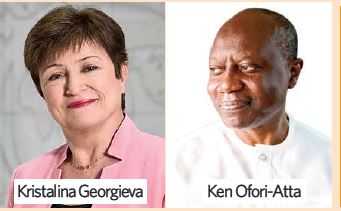THE MINISTRY of Finance and the Bank of Ghana (BoG) yesterday begun discussions with the International Monetary Fund (IMF) team on policies and reforms that could be supported by the Fund’s lending arrangement to bring Ghana out of its present economic challenges.
A statement released by the Finance Ministry said the government was putting together a comprehensive post COVID-19 economic programme which would form the basis for the negotiations with the IMF team led by Stéphane Roudet, Mission Chief for Ghana.
“Government negotiations with respect to the IMF-supported programme is commencing this week and we are optimistic about making progress in our discussions,” it said.
According to the statement, the programme aims at establishing a macro-fiscal path that ensures debt sustainability and macroeconomic stability underpinned by key structural reforms and social protection.
It maintained that a key prerequisite for a programme is confirmation that Ghana’s debt is on a sustainable path, thus requiring a comprehensive Debt Sustainability Analysis (DSA), which is currently ongoing.
“Government remains committed, and shall continue to actively engage all stakeholders, both public and private, in a clear and transparent manner as we seek to fast-track this process,” it added.
The IMF staff are expected to further engage with other stakeholders including Parliament, business associations and civil society groups during the visit.
The discussions with government and other stakeholders will end on October 7, 2022.
In July, 2022, an IMF staff team led by Carlo Sdralevich visited Accra to assess the current economic situation and discuss the broad lines of the government’s Enhanced Domestic Programme that could be supported by the IMF.
The IMF team met with Vice President Mahamudu Bawumia, Finance Minister Ken Ofori-Atta, and the Governor of the Bank of Ghana, Dr. Ernest Addison. The team also met with the Finance Committee of Parliament, civil society organisations, and development partners, including UNICEF and the World Bank, to engage on social spending.
At the end of the meeting, the IMF reaffirmed its commitment to support Ghana at this difficult time, consistent with its policies.
“Ghana is facing a challenging economic and social situation amid an increasingly difficult global environment. The fiscal and debt situation has severely worsened following the COVID-19 pandemic. At the same time, investors’ concerns have triggered credit rating downgrades, capital outflows, loss of external market access, and rising domestic borrowing costs.
“In addition, the global economic shock caused by the war in Ukraine is hitting Ghana at a time when the country is still recovering from the COVID-19 pandemic shock and with limited room for manoeuvre.
These adverse developments have contributed to slowing economic growth, accumulation of unpaid bills, a large exchange rate depreciation, and a surge in inflation,” Mr. Sdralevich said.
It further said that it held initial discussions on a comprehensive reform package to restore macroeconomic stability and anchor debt sustainability, adding, the team made progress in assessing the economic situation and identifying policy priorities in the near term.
The discussions focused on improving fiscal balances in a sustainable way while protecting the vulnerable and poor; ensuring credibility of the monetary policy and exchange rate regimes; preserving financial sector stability; and designing reforms to enhance growth, create jobs, and strengthen governance.
It concluded that the IMF staff will continue to monitor the economic and social situation closely and engage in the coming weeks with the authorities on the formulation of their Enhanced Domestic Programme that could be supported by an IMF arrangement and with broad stakeholders’ consultation.
BY Jamila Akweley Okertchiri

